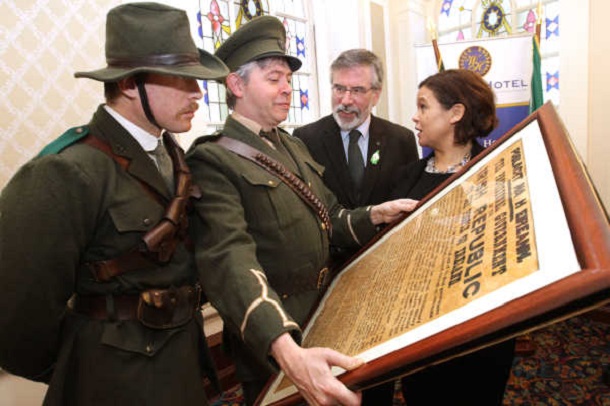24 February 2015
1916 commemoration should be rescued from revisionists

Cognitive dissonance: anxiety that results from simultaneously holding contradictory or otherwise incompatible attitudes, beliefs
WRITERS at the Irish Independent were left experiencing an acute bout of cognitive dissonance at the announcement by Sinn Féin of their centenary commemorations programme for the 1916 Rising.
While one could be forgiven for believing any journalist with a truly independent thought in their brain would have difficulty in not feeling conflicted in the Establishment echo chamber that is Independent House, the latest conundrum giving the Indo a pain in the membrane is something they've had 100 years to prepare for.
If the Indo's coverage at the time was anything to go by, then the 1916 Rising should be dismissed as a little more than a criminal insurrection instigated by traitors to the Crown. The trouble is, that doesn't quite line up with the overwhelming public perception of the rebellion, and the poor Indo had to change with the times.
After the Rising and the Tan War, and after the public had largely forgotten its cheerleading of Britain's execution squads, the Indo snuggled into a comfortable pro-Establishment position in the newly-founded state born out of violent revolution. But with the anniversary of 1916 looming large, there's panic in the air. The Indo is having difficulty riding two horses at once.
The plans, or lack of plans, by their buddies in Government to remember one of the great blows for Irish freedom have been denounced and ridiculed by the public as a complete omnishambles.
Meanwhile, Sinn Féin's series of events have received broad welcome from many across Irish society – including relatives of the 1916 leaders. With its classic hyperbole, the Indo screamed: "State should rescue 1916 centenary from tribal hijackings.”
“Why 1916 relatives should shun Sinn Féin," was another. The rather confusing pieces which followed reflect a strand of opinion which runs through much of the mainstream media – the legitimacy of republicanism and of standing up to a foreign oppressor ended as soon as the conservative statelet came into existence in 1922.
Therefore, when Gerry Adams mentioned the unbroken chain of republican heroes from Wolfe Tone, to Robert Emmet, to Pádraig Pearse, Bobby Sands, Máire Drumm and Maireád Farrell . . . he should have stopped at Pearse.
Indo scribes believe it is unfathomable that Sinn Féin (whom they describe as a party "with a violent recent past") be allowed to commemorate the Easter Rising at all. That the Rising was actually a violent event in itself which left many hundreds dead, including uninvolved ('innocent') civilians, is an uncomfortable fact.
If some of Talbot Steet's revisionists got their way, schoolbooks would tell us that Constance Markievicz used only a feather duster against the enemy, and Pádraig Pearse stood on the roof of the GPO defiantly reciting poetry as the British gunboat HMS Helga sailed up the Liffey, justifiably pummeling north Dublin City into dust.
Much of the mainstream media's vitriol will be reserved for those among us who suggest that the Proclamation is unfinished business. Those in the North who had fought just as hard for their freedom and independence as the flying columns of Munster or Michael Collins's famous and very violent, death-dealing 'Squad' in Dublin, yet found themselves living in a sectarian one-party statelet run by religious supremacists, should have simply piped-down and accepted their fate as second-class citizens.
Another article claims that Sinn Féin have no links to 1916, instead "Fine Gael is the primary party which can claim lineal descent from 1916 leaders”! That will be news to many that a party founded 17 years after the Rising by the coalescing of a bunch of quasi-fascist and right-wing organisations is now the primary party of 1916.
Sinn Féin's "alarming" plans are "everything that this state has fought to distance itself from", we are told. On this point the Indo gets it right, even if that's not its intention. Because the state certainly has done everything in its power to distance itself from republicanism, from equality, and from the ideals of the Proclamation.
Does anybody seriously believe the men and women of 1916 fought to see a state ruled by a government subservient to foreign interests and imposing a vicious austerity programme against ordinary people at the behest of international capitalists?
The revisionists who blather on about fears of the commemoration being 'hijacked' by republicans intent on continuing the struggle for a united Ireland of equals would do well to remember the words of Pearse:
"A free Ireland would not, and could not, have hunger in her fertile vales and squalor in her cities.
“Ireland has resources to feed five times her population; a free Ireland will make those resources available.
“A free Ireland would drain the bogs, would harness the rivers, would plant the wastes, would improve the agriculture, would protect the fisheries, would foster industries, would promote commerce, would diminish extravagant expenditure, would beautify the cities, would educate the workers – would, in short, govern herself as no external power could govern her."
Follow us on Facebook
An Phoblacht on Twitter
Uncomfortable Conversations

An initiative for dialogue
for reconciliation
— — — — — — —
Contributions from key figures in the churches, academia and wider civic society as well as senior republican figures





